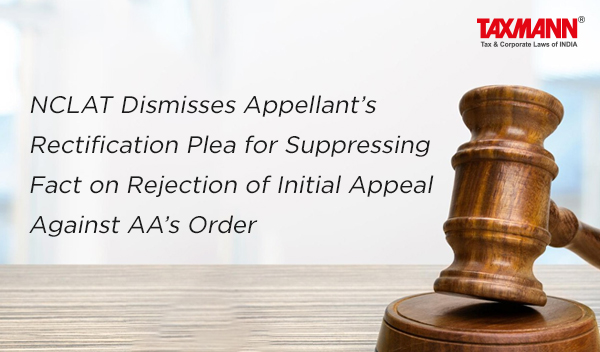NCLAT Dismisses Appellant’s Rectification Plea for Suppressing Fact on Rejection of Initial Appeal Against AA’s Order
- Blog|News|Company Law|
- 2 Min Read
- By Taxmann
- |
- Last Updated on 20 October, 2023

Case Details: Hemendra Aran v. Aranca (Mumbai) (P.) Ltd. - [2023] 155 taxmann.com 26 (NCLAT-New Delhi)
Judiciary and Counsel Details
-
- Rakesh Kumar, Judicial Member & Dr Alok Srivastava, Technical Member
- K.D. Chatterjee, Sr. Adv., Anuj Tiwari, Swankit Nanda, Nikhil Anand & Rahul Kumar, Advs. for the Appellant.
- N. Ganapathy, Sr. Adv., Dhiraj Mhetre, Manpreet Lamba, Ms Shivani Sharma, Advs., Krishnendu Datta, Sr. Adv., Ms Shivani Sharma, Ms Neha, Satyasrikant Virtha, Advs., Dhruva Mukherjee, Sr. Adv., Anmol Chandan, Rishi Gautam, Anando Mukherjee and Manpreet Lamba, Advs. for the Respondent.
Facts of the Case
In the instant case, in a petition filed under section 241 of the Companies Act, 2013 against the respondent company, an order was passed by the Adjudicating Authority (NCLT) directing the appellant (i.e. director of the respondent company) to deposit an amount with registrar of the NCLT and counsel of the appellant gave consent on behalf of the appellant for depositing the said amount within three weeks.
The NCLT granted three weeks to deposit the said amount. The appellant preferred an appeal against the said order before the instant court and the same was rejected. Thereafter, the appellant filed an application for rectification of the said directions before the NCLT but the same was rejected by the impugned order.
NCLT Held
The NCLT held the appellant guilty of disobeying the said order of depositing the amount.
The appellant filed an instant appeal against the impugned order and contended that consent was given by the counsel of the appellant appearing before the NCLT without its authorization for depositing the said amount.
The NCLAT observed that since the initial appeal was dismissed, the appellant was not authorized to file a rectification petition in view of the proviso of section 420(2) of the Companies Act, 2013.
The NCLAT held that since the appellant had suppressed/concealed the fact regarding the rejection of the initial appeal in the instant appeal and the appellant had not approached the instant Tribunal with clean hands, the instant appeal was to be dismissed.
List of Cases Reviewed
-
- Aranca (Mumbai) (P.) Ltd. v. Hemendra Aran [2023] 155 taxmann.com 25 (NCLT – Mum.) (para 30) affirmed [See Annex].
List of Cases Referred to
-
- Sri. Swami Krishnanand Govindanand v. M.D. Oswal Hosiery (Regd.) [2002] 3 SCC 39 (para 5)
- Prestige Lights Ltd. v. State Bank of India [2007] 78 SCL 467 (SC) (para 16)
- Svenska Handelsbanken v. Indian Charge Chrome Ltd. [1994] 2 SCC 155 (para 17).
Disclaimer: The content/information published on the website is only for general information of the user and shall not be construed as legal advice. While the Taxmann has exercised reasonable efforts to ensure the veracity of information/content published, Taxmann shall be under no liability in any manner whatsoever for incorrect information, if any.

Taxmann Publications has a dedicated in-house Research & Editorial Team. This team consists of a team of Chartered Accountants, Company Secretaries, and Lawyers. This team works under the guidance and supervision of editor-in-chief Mr Rakesh Bhargava.
The Research and Editorial Team is responsible for developing reliable and accurate content for the readers. The team follows the six-sigma approach to achieve the benchmark of zero error in its publications and research platforms. The team ensures that the following publication guidelines are thoroughly followed while developing the content:
- The statutory material is obtained only from the authorized and reliable sources
- All the latest developments in the judicial and legislative fields are covered
- Prepare the analytical write-ups on current, controversial, and important issues to help the readers to understand the concept and its implications
- Every content published by Taxmann is complete, accurate and lucid
- All evidence-based statements are supported with proper reference to Section, Circular No., Notification No. or citations
- The golden rules of grammar, style and consistency are thoroughly followed
- Font and size that’s easy to read and remain consistent across all imprint and digital publications are applied



 CA | CS | CMA
CA | CS | CMA
